As a hotelier, there might be multiple scenarios in which you need metrics to evaluate your hotel’s performance. Among too many KPIs, it is very easy to get lost. In this blog, we will look at important Hotel KPIs through which you can evaluate your hotel performance.
What is Hotel KPI and why is it necessary for hoteliers?
KPIs are known as key performance indicators, which are the metrics that let you set a standard to measure the potential and success rate of your hotel.
Similar to any other business, the hotel industry has set some metrics that help hoteliers evaluate their hotel’s performance.
Below are some Key Performance Indicators for the hotel industry that will help hotel owners evaluate their hotels.

Hotel Occupancy Rate
This is the most basic KPI for hotels to determine your hotel’s performance. This determines, what percentage of rooms are currently booked in your hotel.
The hotel occupancy rate is the ratio of the total number of occupied rooms to the total number of available rooms.
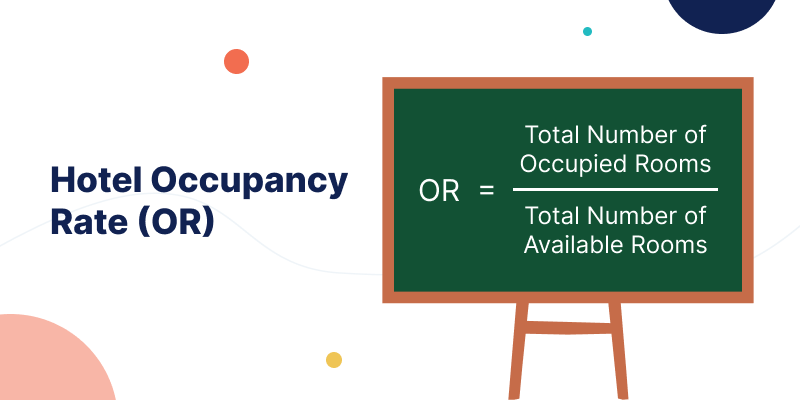
Why Hotel Occupancy rate is useful?
The hotel occupancy rate indicates the percentage of rooms in use. It helps in pricing strategies, resource allocation, and budgeting.
Average Daily Rate (ADR)
ADR is used to calculate the average rate per occupied room. It is the ratio of Room Revenue to the number of occupied rooms
ADR helps you to compare your financial performance with the competitor’s hotel. ADR is also helpful to evaluate the previous season’s performance so that hoteliers can take appropriate action to improve it.
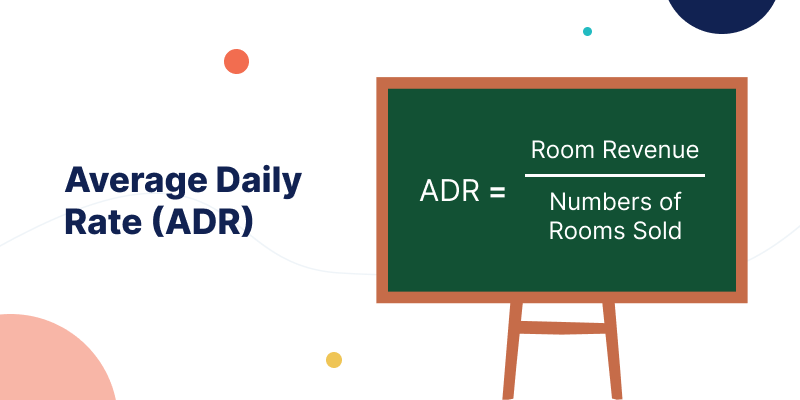
Why ADR average daily rate is important?
The ADR directly reflects the average price that guests are willing to pay for rooms. This hotel KPI helps hoteliers to prepare their strategy and enhance revenue performance.
Revenue per room available (RevPAR)
RevPAR is one of the most important KPI for hotels that hoteliers depend upon. RevPAR is similar to the average daily rate, but it also includes your empty rooms.
You can calculate RevPAR by multiplying the Average Daily rate with the Occupancy rate.
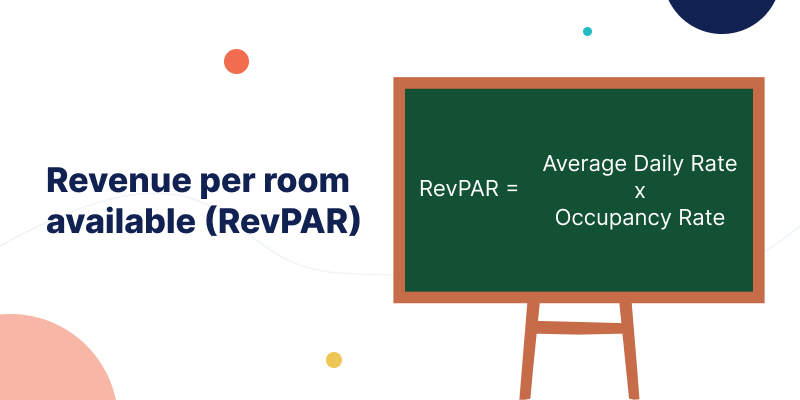
Why RevPAR is important?
RevPAR helps in measuring the hotel’s ability to generate revenue from its available rooms. As this Hotel KPI involves both occupancy rates and room rates, RevPAR provides a clear and concise overview of a hotel’s financial performance. As the RevPAR is dependent upon the occupancy rate, maintaining a good RevPar is difficult during off-seasons. You can follow our blog to know more about how to maintain RevPar in off seasons.
EBITDA
EBITDA simply means, Earnings before interest, Depreciation and Amortization. It is the earnings from which these 4 assets are not deducted.
The EBITDA can be breakdown into:
- Earnings: This is your company or hotel’s net income profit after deducting all expenses.
- Before Interest: Adds back interest expenses to the earnings figure.
- Before Taxes: Adds back income taxes and other taxes.
- Before Depreciation: This is the depreciation of tangible assets such as buildings and equipment.
- Before Amortization: Amortization is similar to depreciation but pertains to intangible assets (like patents, copyrights, or trademarks).
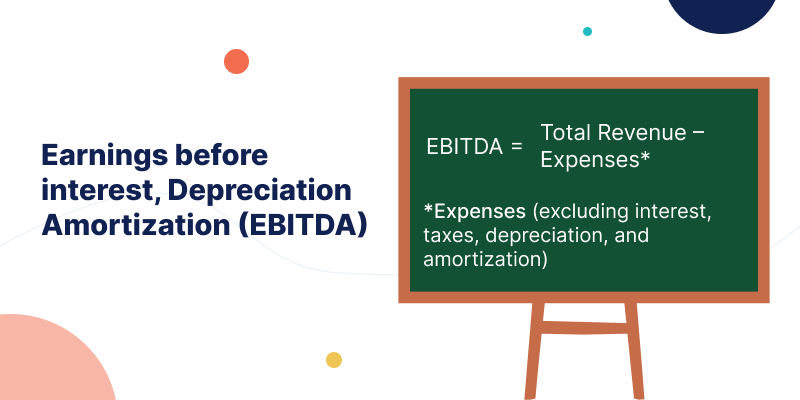
Why EBITDA is necessary?
It gives a simple picture of a company’s core profitability and operating performance by excluding non-operating factors and non-cash expenses.
Total revenue and total bookings
Total revenue is simply the calculation of total earnings from all the sellable products and services such as rooms, Food and Beverages, transportation, and Additional Services.
The total bookings are the number of bookings you received over a period of time through all of your bookings.
Average Length of Stay (ALOS)
This is an important KPI for hotels which is used to calculate the average length of stay of your guests.
To calculate ALOS, firstly you need to calculate the Length of Stay (LOS).
LOS simply means the duration or the number of days, the guests stay at your hotel.
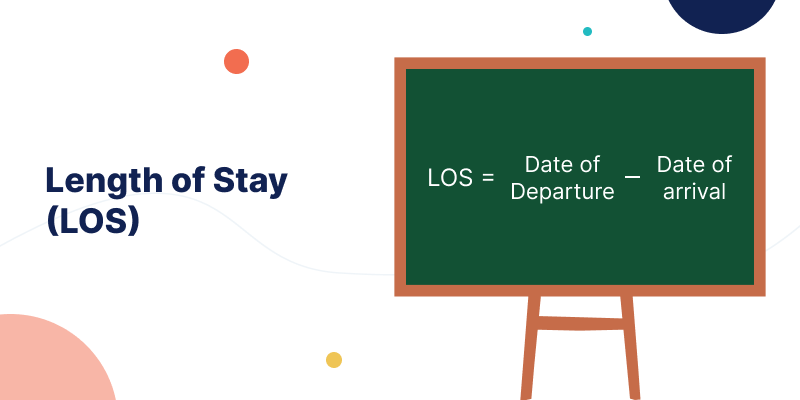
Similarly, the ALOS can be calculated as the ratio of the number of occupied room days (LOS) to the number of bookings.
For example: Consider the following booking details:
- Booking 1, 20th August – 25th August, LOS = 5
- Booking 2, 10th August – 12th August, LOS = 2
- Booking 3, 01st August – 08th August, LOS = 8
The total LOS for these three reservations = (5+3+8) = 15
Hence, the ALOS = 15/3 = 5

Gross Operating Profit Per Available Room (GOPPAR)
Gross Operating Profit Per Available Room (GOPPAR) is a useful KPI for hotels that helps hotel owners to determine how valuable their hotel is as an asset.
Firstly, you need to know about Gross Operating Profit (GOP).
You can calculate GOP by subtracting operating expenses from hotel revenue.
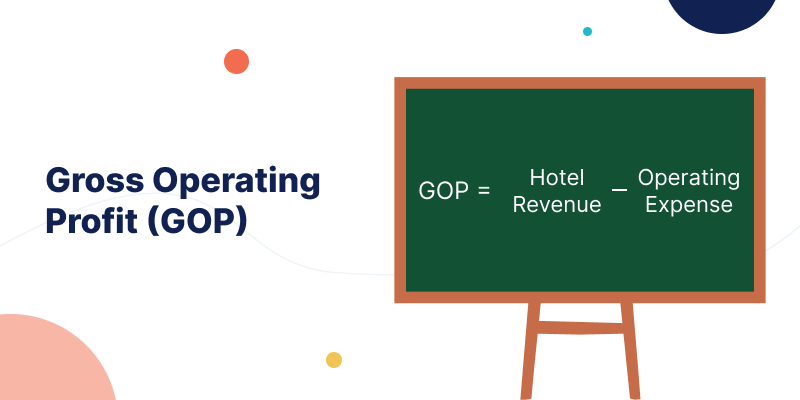
You can calculate GOPPAR by dividing the gross operating profit (GOP) by the number of available rooms in the hotel.

Why GOPPAR is required?
GOPPAR provides a more accurate result of a hotel’s profitability comparatively to other Hotel KPI that consider only revenue. GOPPAR is important as it reflects the financial health of a hotel’s operations.
Cost Per Occupied Room (CPOR)
This Hotel KPI determines the cost that is required to run a hotel.
You can calculate CPOR by dividing the total expense by the number of occupied rooms.

Why CPOR is important?
With the help of CPOR, hoteliers can look at the hotel’s profitability and can take measures to limit their room expenses.
Adjusted Revenue Per Available Room (ARPAR)
ARPAR stands for Adjusted Revenue per available room.
This hotel KPI is use to measure the performance of revenue management of a hotel.
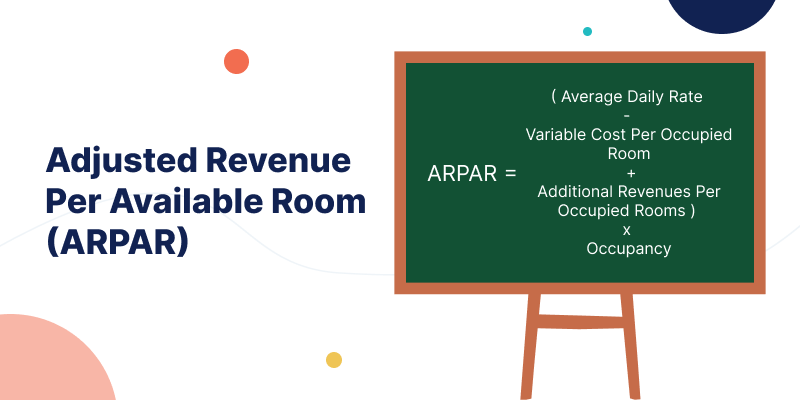
Why ARPAR is important?
In recent years, it has been noted that RevPAR doesn’t give much information about profitability. So, hoteliers have moved to more accurate Hotel KPI such as ARPAR.
Get in Touch with Us
If you’re a hotel owner and looking for an efficient solution to streamline your hotel operations, you might want to explore QloApps – A Free hotel booking software
If you have any further topics of discussion, feel free to connect with us on QloApps Forum.
For any technical assistance kindly raise a ticket.

Be the first to comment.